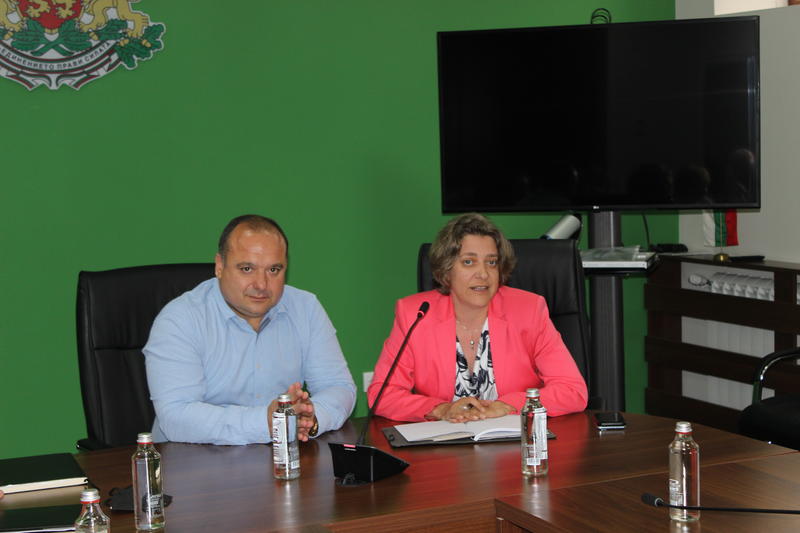Deputy Minister Toncheva: For MOEW priorities are nature, biodiversity and its preservation
07 Jun, 2021 | 18:36“Exercise your powers competently and professionally, because thus we can protect our nature and stop encroachments on biodiversity.” This was said by the Deputy Minister of Environment and Water Emilia Toncheva at a meeting with the regional structures of the Ministry.
She gave the example of the most recent case with the poisoned black vulture near Dobrinishte and reminded that in Bulgaria there is no single solved case of finding the perpetrators of setting poison or poisonous bait. “What happened in Dobrinishte is emblematic. The horse, sprinkled with the poisonous bait was buried at the site where it was found. This means that the poison on the animal's body can penetrate the soil. Therefore, when you receive a signal from NGOs or citizens, I appeal to you to take those extremely seriously,” said Deputy Minister Toncheva. According to her, this is a very serious crime against the nature and biodiversity in Bulgaria and poses a great danger to the life and health of citizens.
Deputy Minister Toncheva advised the directors to use precise wording when writing the protocols for such cases. According to her, it is needed to describe the factual situation in detail and to give instructions to the competent authorities. “In each separate case, you can decide which institutions to refer it to. If you do not do it as quickly and professionally as possible, the chances for solving these serious crimes sharply decrease”, Emilia Toncheva said with determination.
“Crimes against nature cannot be solved without you. You are the engine, you are the defenders of nature on the ground”, concluded Deputy Minister Toncheva.
Deputy Minister Petar Dimitrov said that instructions were being drafted on how to act in such cases.
Today the Ministry of Environment and Water received a signal from the NGO “Green Balkans - Stara Zagora”, which reads: On 04.06.2021 in the morning, during routine tracking of traffic - according to the GPS transmitter of a black vulture named K67 – “BLACKY SKRILL”, with identification marking: K67 - yellow PVC ring with black inscription, on right foot, W0711 - metal ring on left foot, identification microchip № 982091065667300, with transmitter with registration № 210436, employee of the NGO “Green Balkans - Stara Zagora” Simeon Angelov Marin found unusual behavior: the bird's body temperature was normal at 17:29 on 03.06.2021, then at 02:57 on 04.06.2021 it dropped sharply, and the accelerometer shows unnatural data from the transmitter. The point where the bird last had a normal temperature is near Dobrinishte, after which there was a registered drop in body temperature and movement of the transmitter ending in the Mesta River.
The black vulture was reintroduced into Bulgarian nature by the NGO “Green Balkans - Stara Zagora”, which carries out activities under the international project “Bright future for the black vulture” - LIFE14 NAT / BG / 649.
The black vulture is a species of conservational significance - it is placed under protection by the Biodiversity Act (BDA) of 2002. The species is included in the Red Book of the Republic of Bulgaria, as well as in Annex №3 to Art. 37 of the BDA, as a protected species and in Appendix №2 to Art. 6, para. 1, item 2 and item 3 of the BDA, as a species requiring declaration of habitat protection zones through the Natura 2000 network.
Art. 6, para. 1, item 2 of the BDA provides for the protection of the habitats of species under DIRECTIVE 92/43/EEC of the Council for the conservation of natural habitats and of wild flora and fauna - for animal and plant species listed in Annex № 2 from the BDA. According to the provision of art. 6, para 1, item 3 of the BDA, the protection of the habitats of species under Council DIRECTIVE 79/409/EEC on the protection of wild birds is to be ensured - for the bird species listed in Annex №2 of the BDA. According to the provision of art. 37 of the BDA, the wild animal and plant species listed in Annex № 3 of the BDA are declared protected on the territory of the whole country. The species marked with a "!" are also included in the Annex to Resolution № 6 (1998) of the Standing Committee of the Berne Convention.
